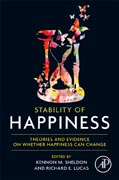
Stability of Happiness: Theories and Evidence on Whether Happiness Can Change
Sheldon, Kennon M
Lucas, Richard E.
The right to pursue happiness is one of the dominant themes of western culture, and understanding the causes of happiness is one of the primary goals of the positive psychology movement. However, before the causality question can even be considered, a more basic question must be addressed: CAN happiness change? Reasons for skepticism include the notion of a genetic set point for happiness, i.e. a stable personal baseline of happiness to which individuals will always return, no matter how much their lives change for the better; the life-span stability of happiness-related traits such as neuroticism and extraversion; and the powerful processes of hedonic adaptation, which erode the positive effects of any fortuitous life change. This book investigates prominent theories on happiness with the research evidence to discuss when and how happiness changes and for how long. Identifies all major theories of happinessReviews empirical results on happiness longevity/stabilityDiscusses mitigating factors in what influences happiness longevity INDICE: Preface Chapter 1 - Is it Possible to Become a Permanently Happier Person? An Overview of the Issues and the Book Chapter 2 - Well-being: Heritable and changeable Chapter 3 - Symptoms of Wellness: Happiness and Eudaimonia from a Self-Determination Perspective Chapter 4 - Is Lasting Change Possible? Lessons From the Hedonic Adaptation Prevention Model Chapter 5 - Chronic Happiness Change Signals Pathology: Set-points for Homeostatically Protected Mood Explain Why Chapter 6 - National Panel Studies Show Substantial Minorities Recording Long Term Change In Life Satisfaction: Implications For Set-Point Theory Chapter 7 - Does Happiness Change? Evidence from Longitudinal Studies Chapter 8 - Increasing Happiness by Well-being Therapy Chapter 9 - Term Change of Happiness in Nations: Twice More Rise Than Decline Since the 1970s Chapter 10 - Set Point Theory and Public Policy Chapter 11 - Economic Approaches to Understanding Change in Happiness Chapter 12 - Personality Traits as Potential Moderators of Well-being: Setting a Foundation for Future Research Chapter 13 - Statistical Models for Analyzing Change in Happiness Chapter 14 - Stable Happiness Dies in Middle-Age: A Guide to Future Research
- ISBN: 978-0-12-411478-4
- Editorial: Academic Press
- Encuadernacion: Cartoné
- Páginas: 334
- Fecha Publicación: 01/08/2014
- Nº Volúmenes: 1
- Idioma: Inglés
